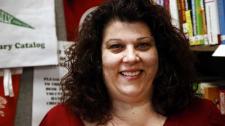Palo Alto High School's Sandra Cernobori is our Counselor of the Month
Posted on Wed, 05/01/2013 - 09:46
College Advisor Sandra Cernobori was sitting at her desk in the College and Career Center of Palo Alto High School in Palo Alto, California, when a parent came in to talk to one of her colleagues. She was not a parent at the school, but had some questions about college admission. A few minutes into the conversation, the visitor said to Cernobori’s fellow advisor, “Let me go get my son, I want him to hear this.” Whereupon she brought into the office her 18-month-old child. Yes, you read that correctly, her 18-month-old child.
Welcome to the world of college advising in the heart of Silicon Valley where the college learning curve -- and the pressure -- starts early for some. Founded in 1894, Palo Alto High School, known as Paly, is nationally known for its academically rigorous environment. Its campus, which serves more than 1900 students, sits across the street from Stanford University. “Our students are often from families that are highly educated or highly value education, so expectations are high,” says Cernobori. “But we also have families where the parents have not attended four-year colleges.”













 Elsa Heydenreich Clark is the Director of College Counseling at
Elsa Heydenreich Clark is the Director of College Counseling at